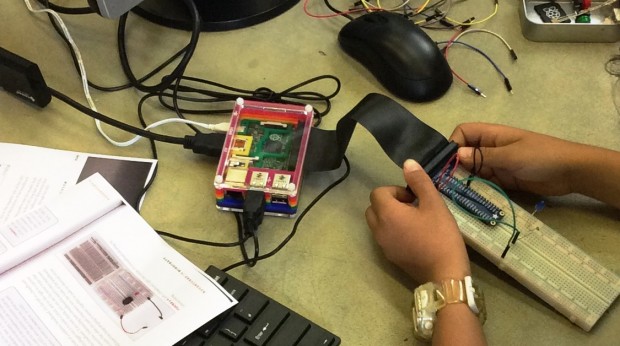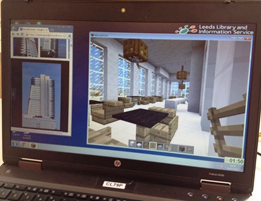[Editors note: Guest post from Jason Tutin, Leeds Libraries on their award winning digital activities]
In March 2016, Leeds Library and Information Service became the only library authority in England to be honoured at the National Coding Awards. The two ‘Highly Commended’ awards were in recognition of events held as part of National Coding Week 2015.
Why get involved in National Coding Week?
One of the aims of National Coding Week is to build coding skills to address the digital skills gap in the workforce. For many years, staff in Leeds Libraries have delivered sessions to improve people’s digital skills. In particular, our IT for Employment sessions and Work Club sessions help people to look for work and apply for jobs online. We had never delivered coding sessions for adults before but we knew this was a growing area of interest. The EU estimates that there will be up to 1.3 million unfilled digital jobs by 2020, some of which will require coding skills. National Coding Week gave us the perfect opportunity to deliver a new session and hopefully attract a new audience.
To get a better idea of how to design a coding session for adults, we spoke to Grant Crofton from Leeds Code Dojo. This is a group dedicated to programming and focussed on practical coding sessions where people learn by doing.

Together we devised an activity called ‘Hour of Code’ which we advertised as a ‘fun hands-on introduction to computer programming’. The session included an online JavaScript tutorial and a presentation from Grant Crofton discussing his career to date and the ways in which coding can open up employment opportunities. The two events at Headingley Library and Leeds Central Library were held in the evening to attract the widest audience. Although our publicity said that no coding experience was necessary, most of the attendees did have some prior knowledge of coding.

The feedback immediately after the sessions told us they had been a success – even before we won the National Coding Week awards! We wanted to build on that success by incorporating coding skills into more sessions for more people. Potential audiences included:
- Children and young people who are learning coding at school
- Parents who want to know more about the skills their children are learning
- Gamers who want to learn more about games design
As a result, we have already expanded our digital learning programme to offer:
- Code Clubs: A series of sessions over six weeks where children learn how to make computer games, animations and websites
- Raspberry Pi: Basic programming with fun, practical projects. Use Scratch to create interactive stories, games and animations or write code to create music with Sonic Pi
- Minecraft Pi: The Raspberry Pi version of the game is the only one that comes with a programming interface where you can write code to manipulate the world around you

Not just coding
Because we know that coding doesn’t appeal to everyone, we have also introduced more practical digital sessions using special equipment and apps such as:
- LittleBits: Create instant circuits for fool-proof inventing. Snap it all together to spark creativity and collaboration. No soldering, no wiring and no programming needed
- Bloxels: Use blocks to build characters, environments and challenges then turn them into a video game. Play, share and collaborate with friends
- MaKey MaKey: An invention kit that encourages people to find creative ways to interact with their computers, by using everyday objects as a replacement for keyboards and mice
- Minecraft stop-motion animation: Minecraft themed background cards, props and environment pieces for endless storytelling. Use the app to create and edit Minecraft stop-motion movies
Leeds Libraries have always helped people to be creative, discover new ideas and learn new skills. The innovative digital activities described here are helping us to adapt that traditional role to attract new audiences.
Keep up to date with activities run by Leeds Libraries by following them on twitter
--------------------------------------------
Please note, this is a guest blog. Views expressed here do not necessarily represent the views of Libraries Taskforce or the DCMS.